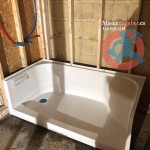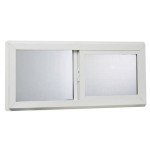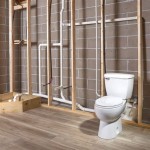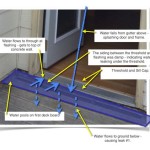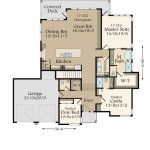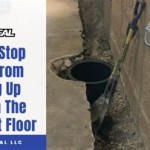What Is The Best Floor Covering For A Concrete Basement Floor?
Selecting the optimal floor covering for a concrete basement floor requires careful consideration of several factors. Basements, by their nature, are often prone to moisture issues, temperature fluctuations, and varying levels of foot traffic. The ideal flooring material should be able to withstand these conditions while also providing comfort, aesthetic appeal, and long-term durability. This article will explore several popular options, outlining their strengths and weaknesses to aid in making an informed decision.
Concrete itself, while a common basement subfloor, is typically unsuitable as a finished flooring surface. It can be cold, hard, and susceptible to cracking over time. Furthermore, untreated concrete is porous, allowing moisture to seep through, potentially leading to mold growth and damage to belongings stored in the basement. Therefore, a suitable floor covering is essential for improving the functionality and livability of a basement space.
Evaluating Key Considerations for Basement Flooring
Before exploring specific flooring options, it’s crucial to understand the key criteria that influence the selection process. These factors will help narrow down the choices and ensure that the chosen material adequately addresses the specific needs of the basement environment.
Moisture Resistance: As mentioned previously, moisture is a primary concern in basements. Ground water can seep through the concrete slab, leading to dampness and potential water damage. The flooring material must be able to resist water absorption and prevent the growth of mold and mildew. Ideally, it should also allow for some level of vapor transmission to avoid trapping moisture beneath the surface.
Durability: Basements often experience heavy foot traffic, especially if they are used as recreation rooms, home offices, or workshops. The flooring material should be durable enough to withstand wear and tear, resist scratches and dents, and maintain its appearance over time. The ability to handle heavy furniture and equipment is also an important consideration.
Comfort and Warmth: Concrete floors can be cold and unforgiving underfoot. A good floor covering should provide a degree of insulation and cushioning to improve comfort. Materials that retain heat or can be paired with underfloor heating systems are particularly desirable in colder climates.
Ease of Installation: The installation process can significantly impact the overall cost of a flooring project. Some materials are relatively easy to install as a DIY project, while others require professional expertise. The complexity of the installation will depend on the specific material, the size and shape of the basement, and the condition of the existing concrete slab.
Aesthetics: While functionality is paramount, the appearance of the flooring is also important. The material should complement the overall design of the basement and create a visually appealing space. A wide range of colors, patterns, and textures are available to suit different styles and preferences.
Cost: The budget is a significant constraint for most homeowners. Flooring materials vary widely in price, and the overall cost will depend on the material itself, the installation costs, and any necessary preparation of the concrete slab. It’s important to consider the long-term value of the flooring, as cheaper options may require more frequent replacement or repairs.
Exploring Common Basement Flooring Options
With these key considerations in mind, let's examine some of the most popular flooring options for concrete basements, analyzing their strengths and weaknesses in relation to the criteria outlined above.
Epoxy Coating: Epoxy coatings are a popular choice for basement floors due to their durability, moisture resistance, and relatively low cost. Epoxy is a thermosetting polymer that creates a seamless, hard-wearing surface when applied to the concrete. It is resistant to stains, chemicals, and abrasion, making it ideal for high-traffic areas. Epoxy coatings are available in a wide range of colors and finishes, allowing for customization of the basement's appearance. However, epoxy can be slippery when wet, and it may require professional installation for best results. Proper preparation of the concrete surface is crucial for ensuring adhesion and preventing peeling.
Concrete Stain and Sealer: Staining and sealing the concrete provides a more decorative and protected surface. Stains penetrate the concrete, adding color and enhancing its natural texture. Sealers create a protective layer that resists moisture, stains, and abrasion. This option is relatively inexpensive and easy to apply as a DIY project. However, it offers less insulation and cushioning than other flooring materials, and it may not be suitable for basements with significant moisture issues. Furthermore, the concrete must be properly prepared and free of cracks or imperfections to achieve a satisfactory result.
Luxury Vinyl Tile (LVT): LVT is a versatile and increasingly popular flooring option for basements. It is available in a wide range of styles, mimicking the look of wood, stone, and tile. LVT is waterproof, durable, and relatively easy to install. It provides a degree of cushioning and warmth, making it more comfortable underfoot than concrete. LVT is also resistant to scratches, stains, and fading. However, it is more expensive than epoxy or concrete stain, and it may not be as durable as some other flooring options in extremely high-traffic areas. The quality of LVT can vary significantly, so it's important to choose a product from a reputable manufacturer.
Engineered Wood Flooring: Engineered wood flooring is a good alternative if the aesthetic of hardwood is desired but solid hardwood is not a viable option due to moisture concerns. Engineered wood consists of a thin layer of real wood veneer bonded to a core of plywood or high-density fiberboard. This construction makes it more dimensionally stable than solid wood, reducing the risk of warping or cupping in humid environments. Engineered wood flooring is durable, aesthetically pleasing, and relatively easy to install. However, it is more expensive than LVT or epoxy, and it is still susceptible to moisture damage if exposed to standing water. A moisture barrier is essential when installing engineered wood flooring over concrete.
Tile Flooring (Ceramic or Porcelain): Tile is a durable, waterproof, and aesthetically versatile flooring option for basements. Ceramic and porcelain tiles are resistant to moisture, stains, and scratches, making them ideal for high-traffic areas. They are available in a wide range of colors, sizes, and styles, allowing for a variety of design possibilities. Tile is also relatively easy to clean and maintain. However, it can be cold and hard underfoot, and it requires a skilled installer for best results. Additionally, tile can be expensive, especially when considering the cost of materials and installation.
Carpet: Carpet offers warmth, comfort, and sound absorption, making it a popular choice for basement recreation rooms and bedrooms. However, carpet is highly susceptible to moisture damage and mold growth, making it a risky choice for basements with moisture problems. If carpet is desired, it is essential to use a waterproof underlayment and choose a moisture-resistant carpet fiber, such as synthetic material like nylon or olefin. Regular cleaning and maintenance are also crucial for preventing mold and mildew growth. Carpet tiles are a more practical solution than broadloom carpet, as individual tiles can be easily replaced if damaged.
Rubber Flooring: Rubber flooring is a durable, resilient, and slip-resistant option for basements, particularly those used as gyms or playrooms. Rubber tiles or rolls are available in a variety of colors and thicknesses, providing cushioning and sound absorption. Rubber flooring is also resistant to moisture, stains, and chemicals. However, it can be expensive, and some rubber products may have a strong odor. The installation process can also be more complex than other flooring options.
Assessing Basement Conditions and Making the Right Choice
Choosing the best flooring covering for a concrete basement floor requires a thorough assessment of the specific conditions of the basement and a careful evaluation of the pros and cons of each flooring option. Ignoring the level of moisture present in concrete can lead to costly repairs down the road. A thorough moisture test should be conducted before any flooring is installed. This test will reveal the extent of the moisture problem and help determine whether a vapor barrier is necessary. If the basement has a history of flooding or high humidity, moisture-resistant flooring options such as epoxy, LVT, or tile are more suitable choices.
Consider the intended use of the basement. A recreation room might benefit from the comfort and warmth of carpet (with proper precautions), while a workshop might require the durability and chemical resistance of epoxy or rubber flooring. If the basement is used as a home office, factors such as sound absorption and aesthetics may be more important.
Finally, the budget is an influence to every project. Factor in the cost of materials, installation, and any necessary preparation of the concrete slab. It’s important to balance cost considerations with the long-term durability and performance of the flooring material. Investing in a higher-quality, moisture-resistant flooring option may save money in the long run by preventing costly repairs or replacements.

The Best Floors To Have Installed Onto Concrete Empire Today Blog

What Is The Best Flooring For A Concrete Floor Basement Illinado Llc

Best Basement Flooring Ideas Options Over Concrete

The Best Flooring Options For Your Basement

Best Basement Flooring The Warmest Floor Covering Is Cork

Best Basement Flooring Ideas Options Over Concrete

Best Flooring Options For Your Basement Ideas Floor

The Best Flooring Options For Your Basement

Best Basement Flooring Over Concrete Bonsai Builders

What Type Of Floor Is Good To Put Over Concrete
